On January 13-14, 2023, the Global Conference on Regional Development 2023, hosted by the Shenzhen Talent Institute, co-organized by Institute for Sustainable Development Goals of Tsinghua University (TUSDG), and supported by the Regional Science Academy, was successfully held in the Shenzhen. This forum is a continuation of the Global Conference on Regional Development 2021, which is jointly convened by Professor Peter Nitschkamp, member of the Royal Netherlands Academy of Arts and Sciences, and Yu Yongda, Professor of School of Public Policy and Management (SPPM) of Tsinghua University. With the theme of ‘Uncertainty in Regional Development: Shocks and Resilience - Innovative Strategies of Regions and Cities’, nearly 100 top experts and scholars from 22 countries and regions around the world conducted in-depth discussions and exchanges on this topic.
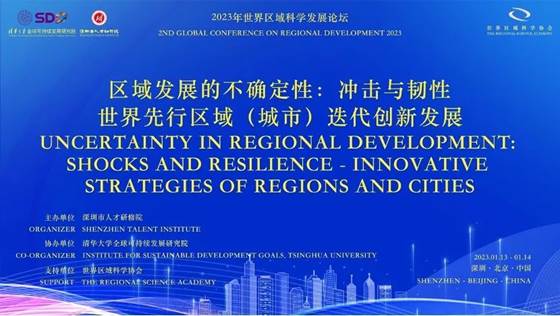
At the meeting, Zhang Lin, Vice President of Shenzhen Talent Institute, Peter Beattie, President of the Regional Science Academy, and Zhu Xufeng, Executive Director of TUSDG, delivered opening speeches. Paul Krugman, 2008 Nobel Prize Laureate in Economics, Michael Porter, Professor of Harvard University, Edward Glaeser, Professor of Harvard University, Saskia Sassen, Professor of Columbia University, Qiu Baoxing, Academician of the International Eurasian Academy of Sciences, Zheng Quanshui, Academician of the Chinese Academy of Sciences, Guo Renzhong, Academician of the Chinese Academy of Engineering, Yang Kaizhong, Academician of the International Eurasian Academy of Sciences, and Yang Xiaoming, Chief Scientist of Sinopharm, delivered keynote speeches. The forum was moderated successively by Peter Nitschkamp, member of the Royal Netherlands Academy of Arts and Sciences, and Yu Yongda, Professor of Tsinghua SPPM, Qi Ye, Tsinghua SPPM, Peter Beattie, President of the Regional Science Academy, Isabelle Thomas, Professor of the University of Leuven (KU Leuven), Terry Kroll, Professor of the Schar School of Policy and Government of George Mason University, Cheng Wenhao, Professor of the Tsinghua SPPM, Gao Yuning, Associate Professor of Tsinghua SPPM, Krima Kurtit, Associate Professor of Open University of the Netherlands, and Cheng Shaoming, Professor of Department of Public Policy and Administration of Florida International University.
On January 13, in the opening speech session, seven guests including Michael Stoeppel, Professor of the Luskin School of Public Affairs of the University of California, Qiu Baoxing, Zheng Quanshui, Guo Renzhong and others shared their thoughts on the impact of the changing global order on the study of the region, the urban technology and its application, and the geo-factors of China's economic growth, and other topics respectively. In the keynote speech session, Prof. Paul Krugman pointed out on ‘the role of new economic geography in responding to regional (urban) emergencies and new models of regional development and governance in the era of uncertainty’ that the Covid-19 pandemic has weakened the effects of knowledge spillovers and incremental gains, and posed an impact on industrial agglomeration. However, with the gradual recovery of the economy in the post pandemic era, it is of great significance to explore new ideas, applications and models of the new economic geography theory for the development of regional science in the world. In the roundtable discussion, Denis Putman, Professor of University Paris I Pantheon Sorbonne, and Professor Zhu Xufeng of Tsinghua SPPM, and others expressed that shock factors such as Covid-19 pandemic proved the important role of new economic geography, and in the more and more complex global context, relying on the traditional governmental support system is no longer sufficient to create a balanced and climate-neutral development of the world, and strengthening international exchanges and co-operation is an inevitable trend.

Keynote Speech by Prof. Paul Krugman
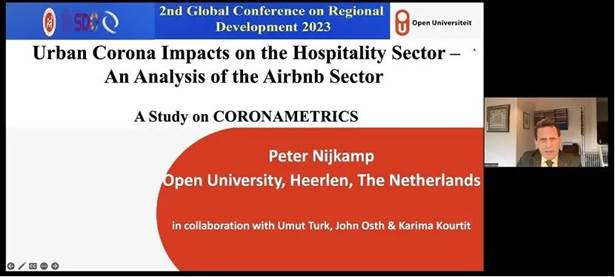
Keynote Speech by Prof. Peter Nijkamp
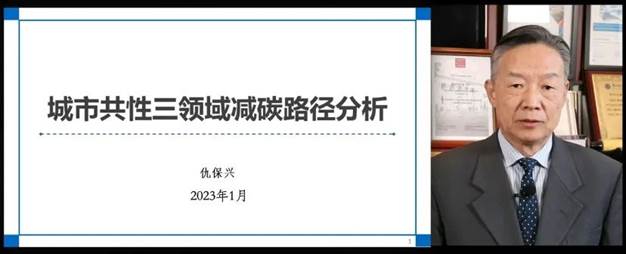
Keynote Speech by Academician Chou Baoxing
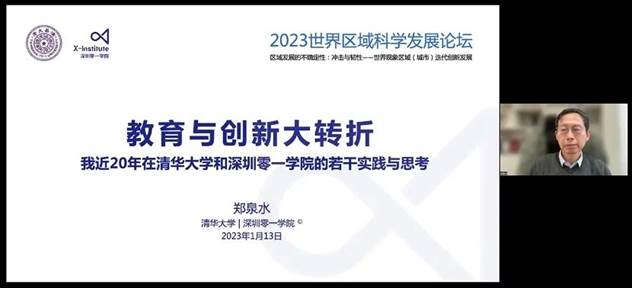
Keynote Speech by Academician Zheng Quanshui
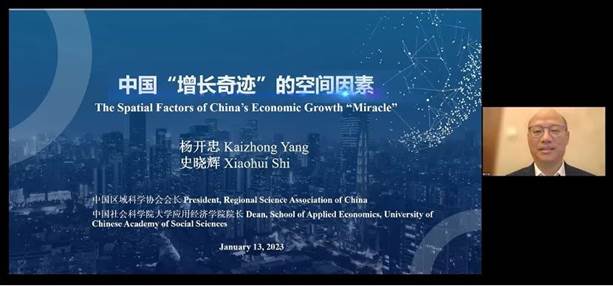
Keynote Speech by Academician Yang Kaizhong
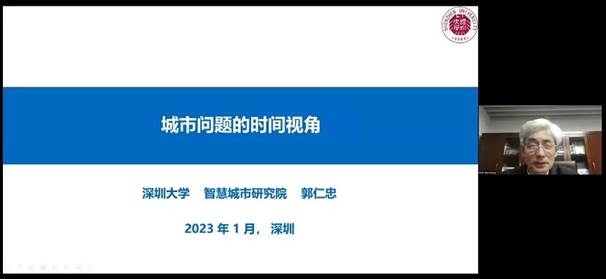
Keynote Speech by Academician Guo Renzhong
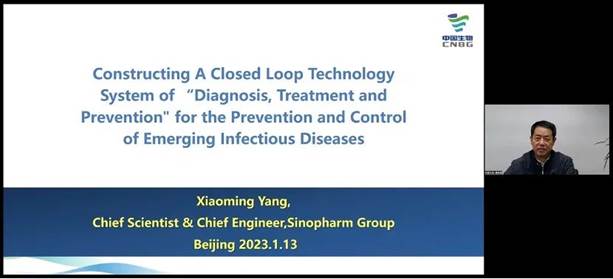
Keynote Speech by Yang Xiaoming
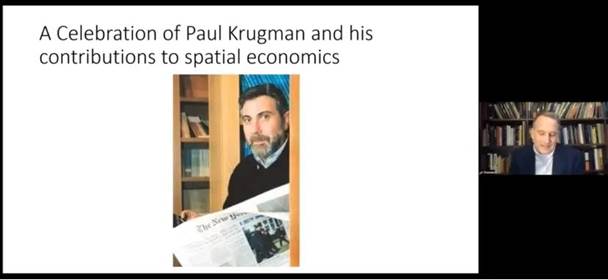
Keynote Speech by Prof. Edward Glaeser

Keynote Speech by Prof. Saskia Sassen
On January 14, Michael Porter, Professor of Harvard University, Professor Saskia Sassen of Columbia University, Professor Zhang Xiliang of Tsinghua University, Researcher Cao Wenlian, Former Director of the Centre for International Cooperation of the National Development and Reform Commission (NDRC), and Associate Professor Yin Chengzhi of the School of Public Administration of Tsinghua University gave keynote speeches on the topics of "China's National Carbon Market in the Context of Carbon Neutrality, New Infrastructure Construction to Support the Integration of Talents in Guangdong, Hong Kong and Macao Bay Area". New Infrastructure Development for Talent Integration in the Greater Bay Area of Guangdong, Hong Kong and Macao" and other topics. Participants believed that when facing shocks in regional and urban development, people tend to pay more attention to the resilience of the region and easily neglect its resistance, which can reduce the degree of damage caused by shocks to the region and the city, and that the resilience of the region and the city will be greatly enhanced if resistance and resilience can be coordinated and integrated.
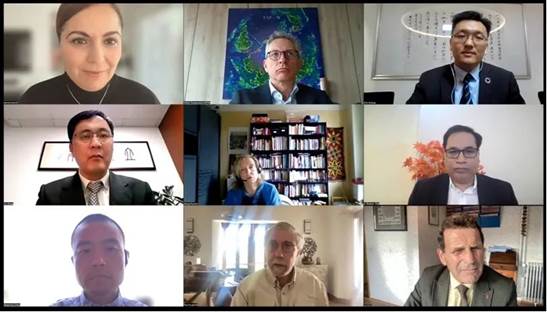
Participants in a Roundtable Discussion with Paul Krugman
The forum also featured a keynote speech by Edward Glaeser, Professor of Harvard University on ‘the Scientific Significance of Paul Krugman’, which provided a forward-looking review of the application and development of the new economic geography theory in 2023. In the later roundtable discussion, Prof. Paul Krugman and six other guests held an in-depth discussion on the theme of ‘how to enhance the competitiveness of regional development and resilience in the face of shocks’, in which the guests believed that: the resilience of the regional economy includes the ability to resist and recover from shocks, or to achieve a breakthrough in the path of development; the foundation of regional development, the level of technology innovation, labour force environment, industry composition, government management, degree of openness to the outside world are the main determinants of regional resistance; based on Shenzhen's development history and experience, with the development of the regional economy technology, capital, talent will play an increasingly important role in the future.
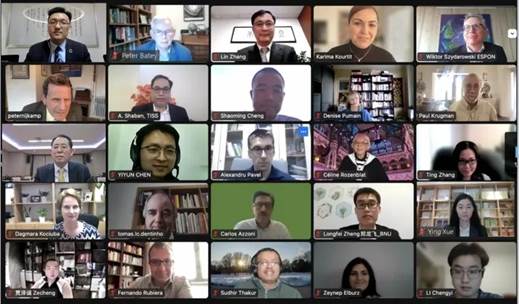
Group Photo of Participants
Beside the main forum, 12 sub-forums were also set up, in which experts and scholars from different countries and regions conducted extensive and in-depth discussions on 12 topics, including spatial dynamics research, data-driven analysis of regions and cities, determinants of regional development, sustainability and spatial economic growth, etc. In addition to the above guests, a number of postdoctoral fellows and doctoral students from Tsinghua SPPM participated and delivered speeches in the sub-forums.
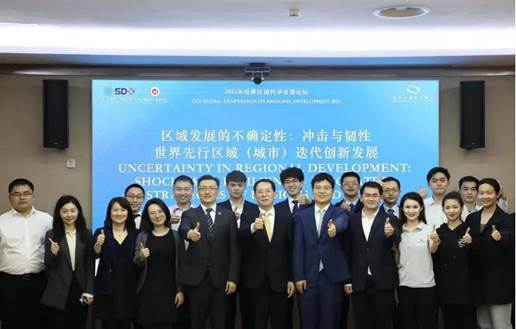
Group Photo of Participants in Shenzhen
The closing ceremony of the Forum was hosted by Prof. Zhu Xufeng, Zhang Yuanxing, Vice President of Shenzhen Talent Institute, Prof. Peter Nitschkamp and Prof. Yu Yongda delivered their closing speeches, jointly envisioning the vision of the Forum and its positive effects on the development of Shenzhen and even the Guangdong-Hong Kong-Macao Greater Bay Area, and also looking forward to the guests’ gathering in Shenzhen, China again.
The success of this forum symbolizes a new milestone in Shenzhen's research on regional and urban development. The experts and scholars attending the forum conducted extensive and in-depth discussions on topics related to the iterative and innovative development of the world's leading regions (cities), with a view to providing advice and suggestions for Shenzhen and the Guangdong-Hong Kong-Macao Greater Bay Area to enhance their resilience.

